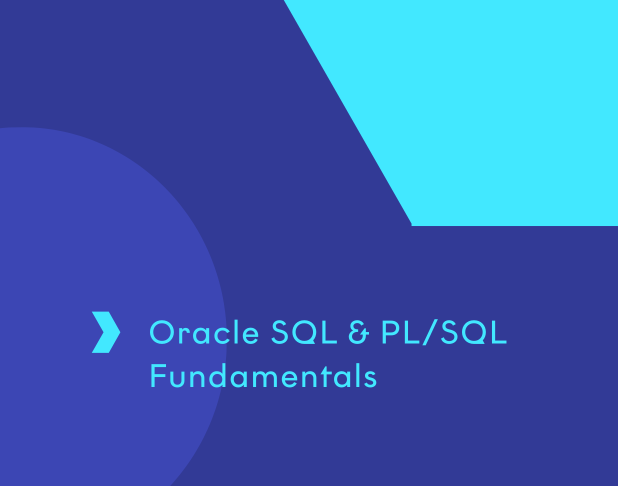Whether you're completely new to Oracle or looking to enhance your SQL skills, this 5-day focused course is a strong starting point. You'll learn how to query data and will be introduced to PL/SQL, plus it’s an ideal foundation if you’re thinking about certification.
Oracle SQL & PL-SQL Fundamentals
Select your learning method

Master the fundamentals of Oracle SQL and PL/SQL
Over five days of immersive and targeted training, you’ll develop practical skills for efficient working with Oracle databases. From writing SQL queries to creating automated processes with PL/SQL, this course gives you the confidence to handle real-world database tasks with ease.
- Retrieve and filter data with SQL
- Join tables and use subqueries
- Create and modify database objects
- Manage data with DML commands
- Write basic PL/SQL blocks
- Use loops and conditions in scripts
- Catch and handle errors in PL/SQL
- Use cursors and collections
What you’ll learn
You’ll gain a working knowledge of Oracle SQL for data retrieval, manipulation, and structure management, before progressing into PL/SQL for procedural programming and automation. You’ll practise concepts in interactive labs that mirror real-world scenarios, ensuring you leave the course with the skills to tackle database queries and more complex programming challenges.
Exploring data dictionaries
The Oracle data dictionary is the definitive reference for understanding your database. You’ll learn to query system views to uncover critical metadata, from column data types and key relationships to index definitions and table dependencies. Mastering these skills enables you to quickly familiarise yourself with new or inherited databases, produce accurate technical documentation, and diagnose structural issues before they impact operations.
Working with dynamic SQL
Dynamic SQL allows you to construct and execute SQL statements at runtime, offering flexibility for building scripts that adapt to different data and environments. You’ll explore key commands, parameter binding, and safe handling techniques to reduce security risks such as SQL injection. Through practical exercises, you’ll identify when dynamic SQL is the most efficient choice and when static SQL is more reliable, equipping you to make informed decisions in real-world projects.
Mastering advanced joins and subqueries
Beyond simple joins, you’ll learn to implement complex multi-table queries, including full outer joins, self-joins, and ANSI-standard join syntax for greater portability. You’ll also write advanced subqueries, such as correlated subqueries, multi-column subqueries, and inline views, to solve challenging reporting requirements. This course focuses on producing queries that are both accurate and performance-optimised, ensuring they scale effectively for large datasets.
Building robust PL/SQL programmes
You’ll develop the ability to create modular, maintainable PL/SQL programmes that combine procedural logic with SQL operations. Starting with anonymous blocks, you’ll progress to using variables, constants, loops, and conditional structures. You’ll also handle exceptions with precision, work with both implicit and explicit cursors, and use records and associative arrays to manage complex datasets. By the end of the course, you’ll be able to automate common tasks, enforce business rules, and deliver scripts that run reliably in production environments.
- 5 days of immersive, instructor-led Oracle training
- Real-world examples to apply skills straight away
- Access to Oracle SQL Developer
- Course workbook and downloadable reference materials
- Delivered online or at a training centre
- Follow-up support from ILX’s expert training team
- ILX certificate of course completion
Key facts
Anyone starting a role that involves working with Oracle databases, including data analysts, support staff, IT technicians, or early-career developers looking to grow their SQL and PL/SQL confidence.
You don’t need any prior experience with Oracle tools or SQL syntax. If you’re comfortable with basic IT concepts and ready to learn something new, this course is an ideal choice.
Our experienced trainers and interactive labs create a focused, practical environment – so you can put theory into practice from day one. (Do not change this copy)
FAQs
This focused Oracle SQL & PL/SQL course blends theory with extensive practice. You’ll learn to query, manage and program Oracle databases, building skills that can be applied immediately in business and IT environments.
How is Oracle SQL different from other types of SQL?
Oracle SQL includes powerful features that set it apart, like PL/SQL (Oracle’s own procedural extension), sequences, and a wide range of built-in functions. You won’t typically see these in platforms like MySQL or SQL Server. This course focuses on how Oracle’s version of SQL works in real-world scenarios, so you’ll build skills that transfer directly into Oracle-based roles.
Will I learn to use Oracle SQL Developer and SQL*Plus?
Yes. Early in the course, you’ll work with both Oracle SQL Developer and SQL*Plus, learning how to create connections, run scripts, and execute queries in each environment. You’ll understand when to use each tool and how they support different stages of database development and administration.
Does the course cover database object creation and management?
Yes. You’ll create and manage tables, indexes, views, sequences and synonyms, as well as define constraints such as primary keys and foreign keys. These skills are essential for maintaining database integrity and ensuring your systems perform efficiently.
How much focus is given to PL/SQL programming?
The final part of the course is dedicated to PL/SQL. You’ll learn to structure PL/SQL blocks, use variables, loops and conditional logic, handle exceptions, and work with cursors. By the end, you’ll be able to write robust, reusable PL/SQL code to automate tasks and enforce business rules.
What our customers say

‘Excellent, very informative and useful.’

‘Great course. Alan has been courteous and informative throughout. Highly recommended and will absolutely be coming back for more courses.’
Join the half a million learners developing their skills with our training
A trusted partner to thousands of organisations worldwide
Our passionate team goes above and beyond to support customer needs
Please complete the form to ensure your quote is accurate and we will contact you soon.